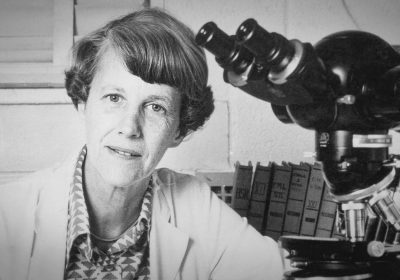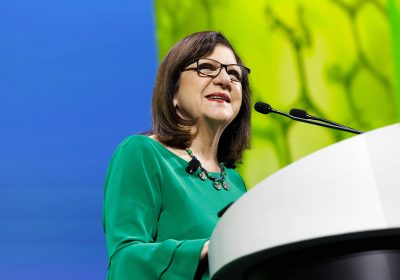
AACR IO: At the Leading Edge of Cancer Immuno-oncology
A new AACR annual conference will focus on the latest advances in cancer immuno-oncology.
A new annual conference from the American Association for Cancer Research® (AACR) is coming to Los Angeles February 23 to 26, 2025. AACR IO: Discovery and Innovation in Cancer Immunology: Revolutionizing Treatment through Immunotherapy will be a comprehensive cancer immuno-oncology (IO) meeting showcasing all aspects of cancer immunology from basic science, translational medicine, and drug development to cancer immunotherapy clinical trial results. The four-day meeting will provide a mix of keynote lectures by luminaries in the field, major symposia, educational sessions, and preclinical and clinical data sessions. The conference will also present late-breaking clinical trial data of IO combination therapies and novel agents in development.

“IO is an established pillar for the treatment of cancer, and the science continues to evolve. We have much more to gain from IO, and that is why the AACR has created this comprehensive annual meeting focused on all aspects of cancer immunotherapy,” said Antoni Ribas, MD, PhD, of the UCLA Jonsson Comprehensive Cancer Center in Los Angeles and the Scientific Committee chair of the new meeting. “Most oncology conferences up to now covered aspects of cancer IO or focused on a subset of IO topics. We plan for this meeting to be all-encompassing of all components of cancer IO.”
AACR IO will bring together a diverse group of stakeholders, from basic scientists working in the laboratory to clinicians running clinical trials, pharmaceutical and biotechnology industry experts, and health care investors, he said.
“About one-third of AACR members consider themselves cancer immunologists,” Dr. Ribas noted. “We want to bring together these members, as well as researchers and clinicians from all different backgrounds, all interested in the goal of advancing IO for cancer.”
Elizabeth Jaffee, MD, deputy director of the Johns Hopkins Kimmel Cancer Center in Baltimore and a leading immunotherapy researcher, is an AACR IO Scientific Committee vice chair.
“This meeting will be unique because it will bring together experts in multiple areas of cancer biology, engineering, computational sciences, and others to describe new areas that are likely to be the next successes in the IO field,” Dr. Jaffee said.
The AACR Annual Meeting, held every April, has highlighted the IO field for the past two decades, focusing predominantly on immune checkpoint inhibitors and CAR T cells, she added. “These agents have likely reached the majority of patients that they will help in their current form,” Dr. Jaffee said. For her, the recent advances in understanding tumor microenvironments are uncovering potential new ways to utilize IO and are leading to the next generation of IO approaches. Dr. Jaffee is looking forward to hearing the latest cellular engineering and vaccine approaches at the upcoming meeting.
The meeting is planned for February—before the AACR Annual Meeting in April and other annual oncology meetings later in the year—at a time when emerging data from clinical trials has no proper, official forum for presentation.
“We want to provide an opportunity for presenting early results in IO clinical trials that cannot wait for the next annual meeting in the spring,” Dr. Ribas said. “With this forum, we are also filling a need at a time of year when there are essentially no opportunities for formal data disclosure.”
One of the keynote speakers will be Nobel laureate James P. Allison, PhD, of the University of Texas MD Anderson Cancer Center in Houston. Dr. Allison will give a lecture on 30 years of CTLA-4, a protein on T cells that acts as an immune checkpoint, dampening the immune response of T cells and preventing them from killing cancer cells. Dr. Allison first conceived of the concept of blocking CTLA-4 to boost the immune system’s attack on cancer cells and developed anti-CTLA-4 antibodies to treat cancer. The Food and Drug Administration approved the first immune checkpoint inhibitor, an anti-CTLA-4 antibody called ipilimumab (Yervoy) to treat metastatic melanoma, in 2011. The immunotherapy works by blocking CTLA-4’s signal to check the immune system, thereby releasing the brakes on the immune system and allowing immune cells to attack tumor cells.
“Cancer immunotherapy provides a realistic chance of long-term survival to patients with different cancers,” said Dr. Ribas. “The science and technology of IO is rapidly advancing. This is why we need this meeting: to bring together people with different expertise and professional backgrounds but focused on the same goal. Because that is when new ideas and connections form and new things are created that lead to breakthroughs.”





